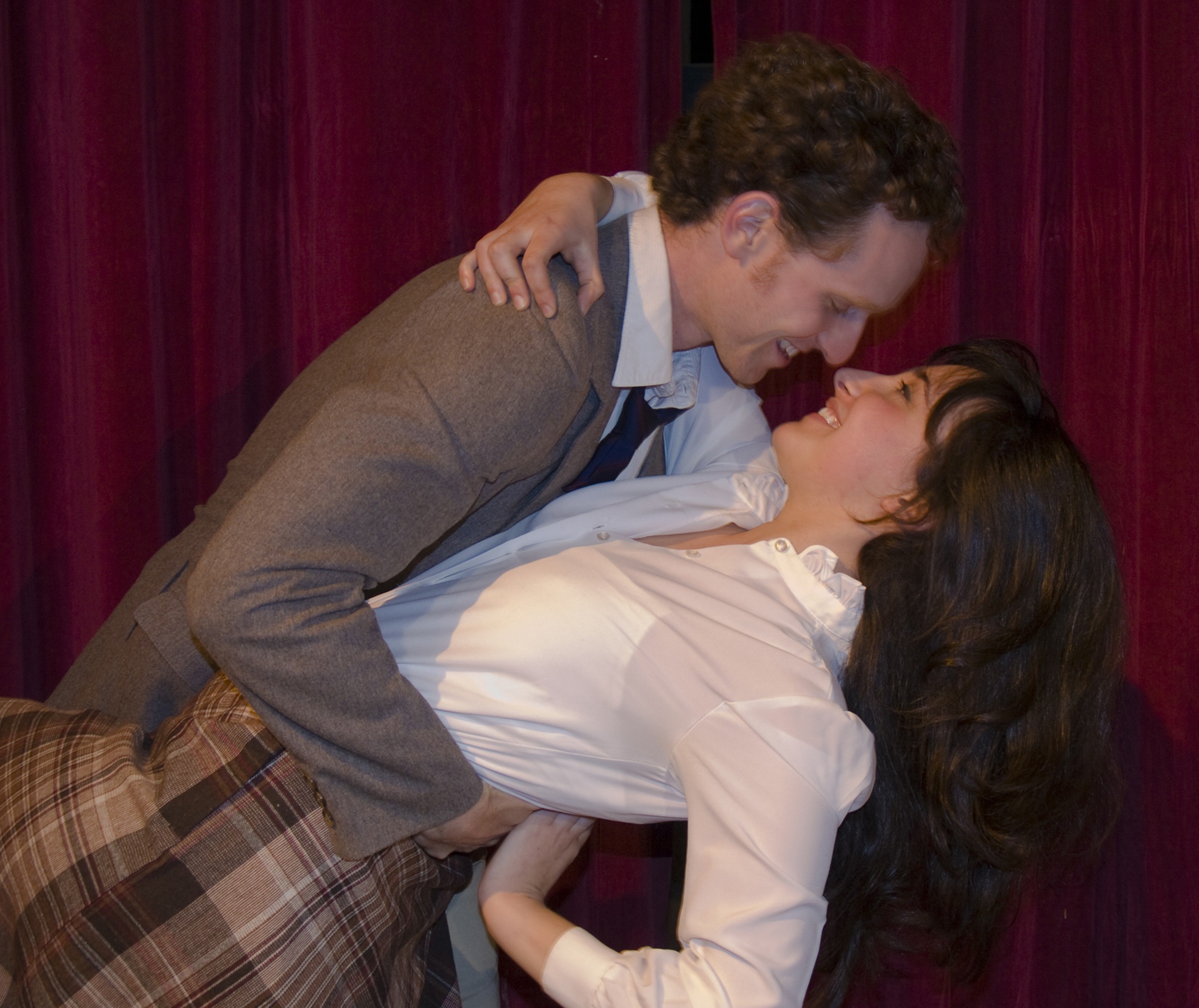
- Alexandra Gellner as Doris and Ilan Ben-Yehuda as George in Same Time Next Year.
In some ways, Same Time Next Year is the quintessential ’70s play. The ’70s were when the ’60s made it to suburbia, and to Middle America generally. Vietnam protest, the Generation Gap, the Sexual Revolution, Women's Liberation, encounter groups, open marriage and a skyrocketing divorce rate -- all of it really happened in the decade that began with Kent State and ended with the Eagles doing disco -- and a big oil well disaster in the Gulf of Mexico.
It's unlikely that this play's premise could have been accepted as fit for stage comedy before the ’70s: A married New Jersey accountant and an Italian Catholic housewife have a passionate night together in northern California -- and then they continue their affair for decades, but only for one weekend every year.
But the ’70s were more than ready. To suggest how avant-garde this wasn't, the play is by Bernard Slade, whose previous work included a Neil Simon knock-off and episodes of Bewitched. He went on to create The Flying Nun and The Partridge Family. But it was provocative enough for some observers to find it offensive, while others thought it was superficial. I suspect there are some in both camps today as well.
Though the 1975 Broadway production was a long-running hit, today it's more familiar from the 1978 movie version starring Ellen Burstyn and Alan Alda. But given its parentage, it may be surprising that Same Time Next Year works much better as a stage play than a movie. At least it did for me in 2010, in the current Ferndale Repertory Theatre production.
Alexandra Gellner as Doris and Ilan Ben-Yehuda as George bring the likeable characters to life. They do the physical comedy well, but don't overdo it. Especially at the beginning, this starts the audience laughing. But the play doesn't dwell on the sex comedy aspect. It doesn't become a farce. The emphasis is on the separate lives of Doris and George, and how their relationship supports each of them, and even each of their marriages. There's a certain quality of a fable about it all, which comes across even as the actors create a convincing relationship on stage with believable charm. They both avoid the temptation of being too whiny. All of this encourages the confidence the audience needs to identify and to laugh.
Director Marilyn McCormick (former Ferndale Rep exec director) brings out the skilled structure and deft writing of Bernard Slade's script, as well as adding some brilliant business. She also keeps the pace from flagging, and so each of the six individual scenes pays off as it should. There's a certain formula to how each of the characters changes in opposite ways from the other, and in how they relate to external events, but the craftsmanship is solid, the actors are winning, and the resulting comedy carries it along.
The play follows the affair that begins in 1951, with the final scene in 1975. External events of those years aren't just background. The slides projected during scene changes depicting events of those decades -- including wars and assassinations as well as sex, drugs and rock & roll -- can evoke the pain of the period as well as nostalgia (even when some events seem shown slightly out of order). Though Slade's chronology also seems doubtful in places, he had the benefit of those years being recent, and he had the ear to suggest each period's particular vocabulary. Technologies may be changing faster at the moment, but each year of the ’60s and early ’70s seemed almost like its own decade.
I happened to see this on Donor Appreciation Night, and some considerable portion of the audience appeared to recall the ’60s and ’70s. Their surprisingly randy laughter suggested, among other things, a certain authenticity in the script. They roared at the mention of Berkeley in 1965, and caught Slade's pitch-perfect Encounter Group psychobabble of the ’70s.
But I suspect that there is enough universal human comedy (and drama) to involve and please those for whom the ’70s are known mostly from a retro sitcom. That life can be more complicated than the rules allow is a theme for all seasons. Besides, there aren't that many laugh-out-loud comedies, even in the summer theatre repertoire. This production provides one of them.
Seth Stone designed the warmly California set, with an assist from Nick Trotter's lighting design. Vikki Young assembled the slide shows, and designed costumes with director Marilyn McCormick. Same Time Next Year plays two more weekends at Ferndale Rep, ending on June 13.
Coming Up: The annual Mad River Festival begins on June 24 with the premiere of Dell'Arte's Blue Lake: the Opera, created in honor of Blue Lake's centennial. The festival also features the return of Los Payasos Mendigos and the presentation of the Prize of Hope 2010 to Jane Lapiner and David Simpson of Petrolia, founders of the environmental theatre group Human Nature. More on all of that in future columns.
Comments